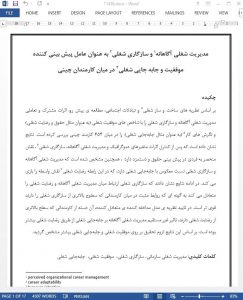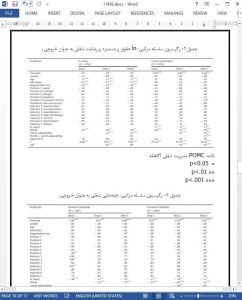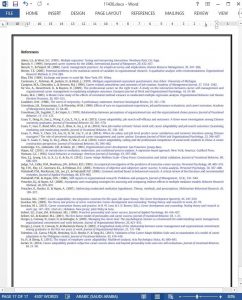Abstract
Based on the theories of career construction and of social exchange, the current research examined the joint and interactive effects of perceived organizational career management and career adaptability on indicators of career success (i.e., salary and career satisfaction) and work attitudes (i.e., turnover intention) among 654 Chinese employees. The results showed that career adaptability played a unique role in predicting salary after controlling for the effects of demographic variables and perceived organizational career management. It was also found that both perceived organizational career management and career adaptability correlated negatively with turnover intention, with these relationships mediated by career satisfaction. The results further showed that career adaptability moderated the relationship between perceived organizational career management and career satisfaction such that this positive relationship was stronger among employees with a higher level of career adaptability. In support of the hypothesized moderated mediation model, for employees with a higher level of career adaptability, the indirect effect of perceived career management on turnover intention through career satisfaction was stronger. These findings carry implications for research on career success and turnover intention.
1. Introduction
In recent years, much work has been done to examine the predictors of individuals' objective (e.g., salary, job level) and subjective (e.g., career satisfaction) career success (Ng, Eby, Sorensen, & Feldman, 2005; Seibert, Crant, & Kraimer, 1999). In a recent metaanalysis, Ng et al. (2005) identified four types of predictors for individual career success: human capital (e.g., education, work experience), organizational sponsorship (e.g., organizational support), socio-demographical status (e.g., gender, age), and stable individual differences (e.g., personality). In spite of the above research progress, questions pertaining to the joint and interactive effects among these predictors on career success and work attitudes have not been fully addressed. Based on career construction theory (Savickas, 1997, 2005, 2013) and social exchange theory (Blau, 1964), this study aimed to examine the joint and interactive effects of perceived organizational career management and career adaptability on indicators of career success (salary and career satisfaction) and workrelated attitudes (turnover intention) among Chinese employees.
4.2. Limitations and future directions
This study has several limitations. First, the nature of this study is correlational and no causal conclusions can be drawn from current results. Future research should overcome this limitation by using a longitudinal research design. Second, as participants rated themselves in the same measurement context, common method variance may influence the current findings (Podsakoff, MacKenzie, Lee, & Podsakoff, 2003). Although the major findings of the current study are moderated mediation effects, which are less influenced by common method bias (Evans, 1985), future research should seek to corroborate the current findings by using multiple sources or multiple time points for data collection.










